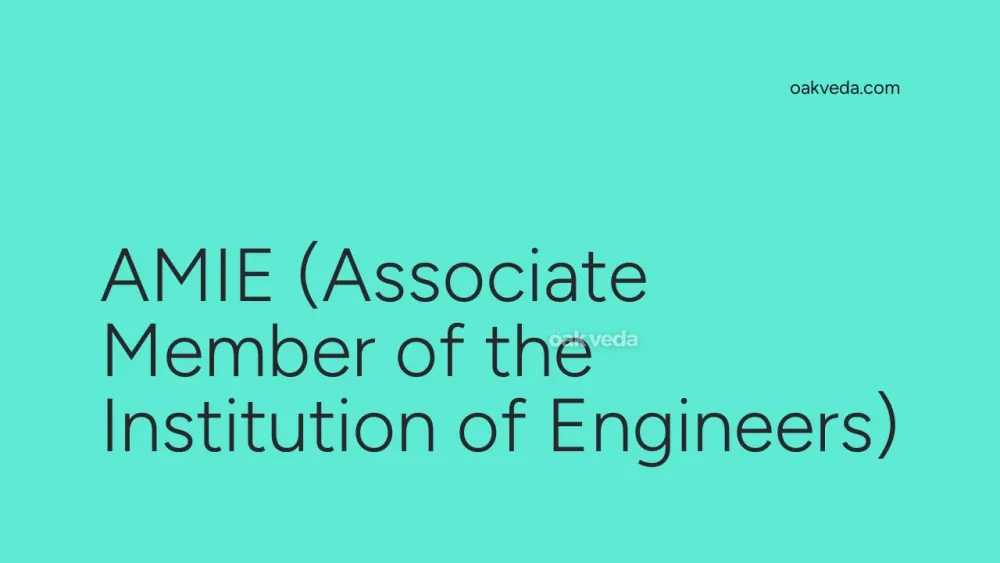
What is the Full Form of AMIE?
AMIE is the full form of Associate Member of the Institution of Engineers. This prestigious qualification is awarded by the Institution of Engineers (India), one of the oldest and largest professional bodies for engineers in the country.
What is Associate Member of the Institution of Engineers?
The Associate Member of the Institution of Engineers (AMIE) is a professional qualification equivalent to a bachelor's degree in engineering. It is recognized by the Government of India, the Union Public Service Commission (UPSC), and various other organizations as being on par with a B.E. or B.Tech degree.
Origin and Development of AMIE
The Institution of Engineers (India) was established in 1920 to promote the general advancement of engineering and technology. The AMIE qualification was introduced as a way to provide engineering education to those who couldn't pursue traditional full-time courses. Over the years, it has evolved to become a respected alternative path to engineering education in India.
How does AMIE work?
AMIE works as a distance learning program, allowing candidates to study engineering while working or pursuing other commitments. The program consists of two sections:
- Section A: Covers fundamental engineering subjects
- Section B: Focuses on specialized branches of engineering
Candidates must pass examinations in both sections to be awarded the AMIE qualification.
Types of AMIE Programs
AMIE offers various specializations, including:
- Civil Engineering
- Mechanical Engineering
- Electrical Engineering
- Electronics and Communication Engineering
- Computer Science and Engineering
- Chemical Engineering
- Production Engineering
Functions of AMIE
The primary functions of the AMIE program include:
- Providing engineering education to working professionals
- Offering a flexible learning path for aspiring engineers
- Maintaining high standards of engineering education
- Promoting continuous professional development
Applications of AMIE
AMIE qualification has wide-ranging applications:
- Career Advancement: AMIE holders can pursue higher positions in engineering fields
- Higher Education: It serves as a foundation for postgraduate studies in engineering
- Civil Services: AMIE graduates are eligible for UPSC examinations
- Research Opportunities: It opens doors to research and development roles
Features of AMIE
Key features of the AMIE program include:
- Flexibility: Allows candidates to study at their own pace
- Affordability: Generally more cost-effective than traditional engineering degrees
- Industry Recognition: Widely accepted by employers in India and abroad
- Comprehensive Curriculum: Covers both theoretical and practical aspects of engineering
Benefits of AMIE
The AMIE qualification offers several benefits:
- Career Growth: Enhances job prospects and salary potential
- Skill Development: Improves technical and problem-solving skills
- Networking: Provides opportunities to connect with other professionals in the field
- Professional Recognition: Offers membership in a prestigious engineering institution
Limitations or Challenges of AMIE
While AMIE is a valuable qualification, it does face some challenges:
- Limited International Recognition: Some countries may not fully recognize AMIE
- Self-Study Discipline: Requires strong self-motivation and time management skills
- Practical Experience: May provide less hands-on experience compared to full-time courses
- Competitive Job Market: AMIE holders may face competition from traditional engineering graduates
Future Developments in AMIE
The Institution of Engineers (India) continues to evolve the AMIE program to meet the changing needs of the industry. Future developments may include:
- Online Learning Platforms: Enhanced digital resources for distance learning
- Industry Partnerships: Increased collaboration with companies for practical training
- Emerging Technologies: Integration of courses on AI, IoT, and other cutting-edge fields
- Global Recognition: Efforts to improve international acceptance of the qualification
FAQs on AMIE Full Form
-
Is AMIE equivalent to a B.Tech degree? Yes, AMIE is recognized as equivalent to a B.E. or B.Tech degree by the Government of India and many organizations.
-
Who is eligible for AMIE? Candidates with a diploma in engineering, 10+2 with PCM subjects, or equivalent qualifications can apply for AMIE.
-
How long does it take to complete AMIE? The duration varies, but typically it takes 3-4 years to complete both Section A and Section B.
-
Can AMIE holders pursue higher studies? Yes, AMIE graduates are eligible for postgraduate programs like M.Tech and MBA in India and abroad.
-
Is AMIE recognized for government jobs? Yes, AMIE is recognized for many government jobs, including UPSC examinations.
In conclusion, the AMIE full form – Associate Member of the Institution of Engineers – represents a valuable pathway for aspiring engineers in India. While it comes with its own set of challenges, the flexibility, affordability, and industry recognition make it an attractive option for many. As the field of engineering continues to evolve, so too will the AMIE program, ensuring its relevance in the years to come.
You may be interested in:

